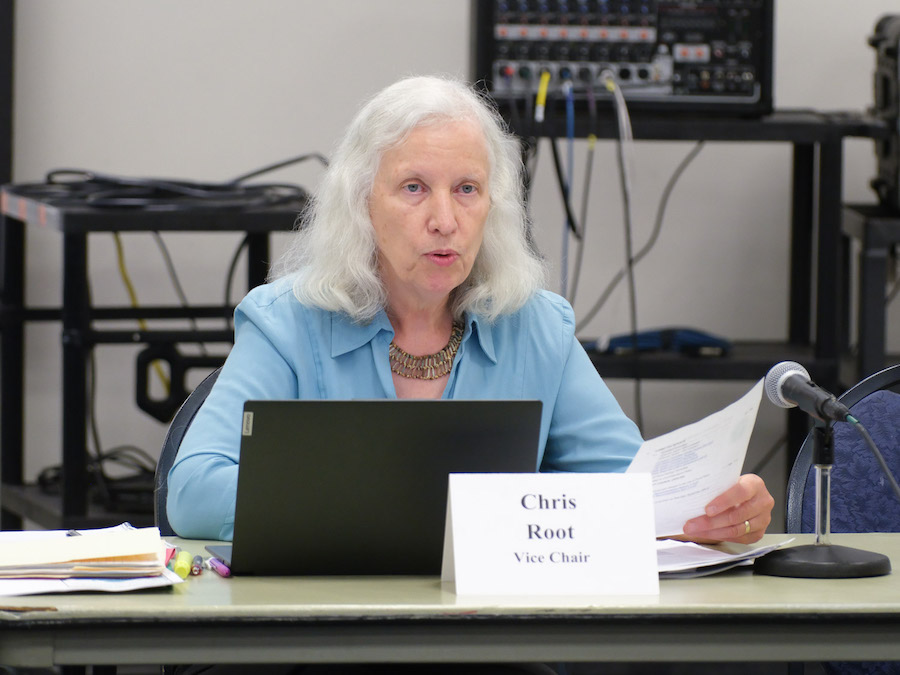ELPD, Oversight Commission Clash Over Complaint Transparency Under New Union Contract
The East Lansing Police Department and city’s police oversight commission are continuing to work through disagreements about the extent to which a new contract between a police union and the city keeps information hidden from the commission and the public.
At the Wednesday, July 9 East Lansing Independent Police Oversight Commission (ELIPOC) meeting, commissioners said they received a notification from Police Chief Jen Brown stating that three complaints involving possible policy violations had been filed during the second quarter of 2025, and that ELIPOC members will receive the complaint summaries once the investigations are closed.
The notification of the three complaints during Quarter 2 was the first the commission had heard of any of them. Brown’s message said the process is in line with the new police contract. Commissioners disagreed.
“This falls into the category of things that have changed since the collective bargaining agreement was signed, where I think the change goes beyond the language of the collective bargaining agreement, and there has been no explanation given to us,” Commissioner Chris Root said.
At a previous meeting, commissioners were concerned about the contract changing the complaint process in a way that makes it so commissioners cannot weigh-in on complaints until after the police chief has issued a final ruling, as was previously allowed. At the July 9 meeting, commissioners said they think they should still be able to view complaints before a ruling, even if they are not allowed to allowed to speak about the complaints publicly until after the ruling.
Root read language from the collective bargaining agreement that states the oversight commission may receive information about complaints, but they must treat it as confidential. Root also noted language that said the commission may ask about the status of a pending complaint. However, she noted, the oversight commission is not being notified of complaints as they come in, instead finding out at the end of the quarter, and members cannot inquire about complaints that they do not know exist.
ELPD Lt. Adam Park, who speaks on behalf of ELPD at ELIPOC meetings, said that commissioners should be notified when complaints are filed, but that he doesn’t know if they should receive the complaint forms until after the investigation is completed.
“There has been no explanation of why the collective bargaining agreement means that we should receive zero information about the complaint, given that the collective bargaining agreement says the oversight body may receive information that… is supposed to be kept confidential,” Root said. “It doesn’t mean that we’re not supposed to get the information all of a sudden.”

Park said giving the commission complaint forms before they can discuss them may be “setting [the commission] up for failure” in complying with the collective bargaining agreement. He added that the process ELPD is following is being done to comply with the agreement, but he will follow up with department leaders with the commissioners’ concerns.
ELIPOC Vice Chair Kath Edsall said that even if ELIPOC cannot discuss all the information in a complaint, being able to talk about a redacted version that keeps information like an officers’ name hidden can still be important. She said descriptions of incidents being released could show patterns of behavior. These patterns could be important to know early on, for commissioners or members of the public who experience similar treatment, as the complaint process can take years if there is arbitration.
Commissioner Michael McDaniel said complaints can show policy issues that may need to be addressed, and the commission could recommend policy changes without referencing any specific complaint.
Ultimately, ELIPOC unanimously approved a lengthy motion that made two separate requests.
The first is that Brown provides two versions of the complaint forms that were filed in Quarter 2. The first would be for commissioners, and include information that must be kept confidential during the complaint process. The second form would be available to the public and redact information that must be kept confidential.
The second request is that Brown send ELIPOC the same two versions of forms for complaints filed after July 1, and going forward.
This story was updated to more accurately reflect Lt. Adam Park’s role at ELIPOC meetings.

